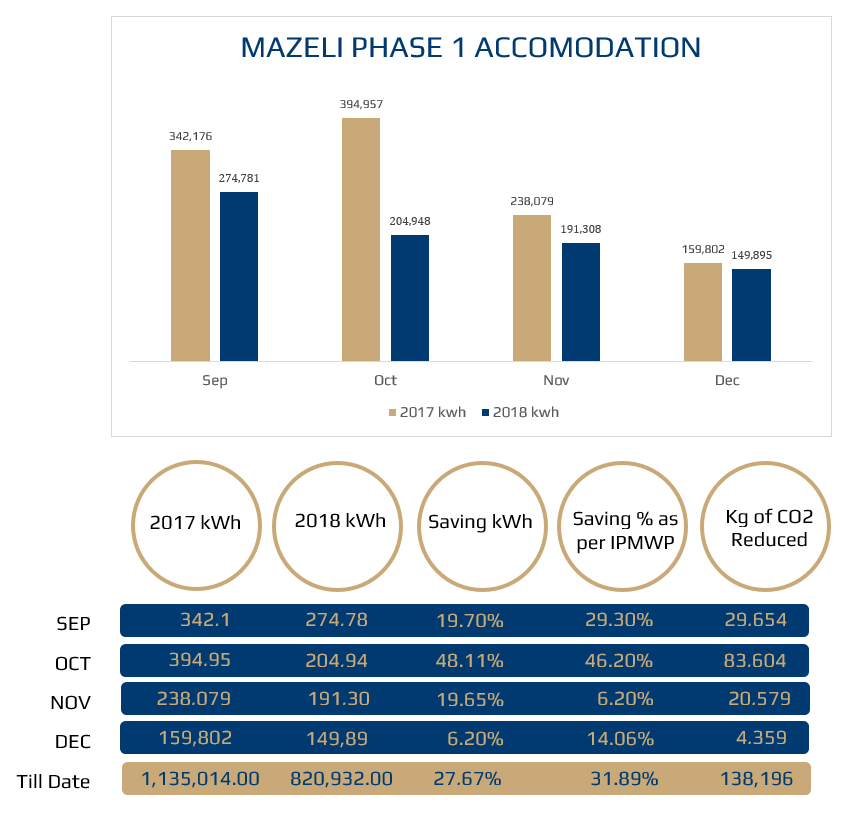Background and Accreditation
Imdaad is an innovation-driven leader in the Integrated Facilities Management (IFM) and Environmental Services industry, with a client portfolio that includes some of the most prestigious developments in the region. The group maintains more than 1000 buildings in the UAE and GCC, including entire communities, seaport free zones and other specialist projects.
Imdaad provides services across the entire IFM spectrum, with an emphasis on technology driven Facility Management. Energy Services are provided by a dedicated division, which is an RSB accredited Energy Service Company (ESCO)and is a registeredparticipatant in tenders from DEWA’s Etihad ESCO. The RSB (Regulatory and Supervisory Bureau) has set a target for a 30% improvement in Dubai’s energy by 2030, which Imdaadstrongly supports.
Whilst one benefitof the RSB target and other similar initiatives is to encourage a general move towards sustainability, it is key to note that improving how energy is utilised within buildings can also be extremely effective at reducing costs for principals. This case study ofImdaad’s recent implementation of energy conservation measures for the HVAC system within its staff accommodation (Manzeli)illustrates how energy saving projects should have a positive ROI.
In fact, Imdaad even offers a guaranteed saving on the annual energy cost of the facilities in which it implements these projects, transferring risk from the client onto itself.
Project Scope and Implementation
The major energy conservation measure was the installation of a new Energy Control Management system (ECM) for the accommodation’s HVAC setup.
The ECM integrated all the existing control systems within the building into one central location. This meant that as well as monitoring the performance of individual pieces of equipment, Imdaad was also able to realise energy savings through effective monitoring of energy expenditure and setting control strategies.
One way in which ECMs can reduce energy waste within the context of HVAC systems is by looking at real-time data and matching that to occupancy. For example, if a room is being unnecessarily and aggressively cooled during off-peak times then this can be identified and rectified through the ECM with potential savings being both forecast and then verified after the change has been made.
In the case of a staff accommodation building such as Manzeli, occupancy is much higher at night (or peak shift timings) whereas in an office building this pattern is likely to be reversed. Therefore, different strategies are required for different projects, all of which can be identified and set through an ECM.
In particular, Imdaad stresses the importance of real-time granular data. Data that is viewed over days or weeks will fail to address intra-day volatility in occupancy and equipment performance, which is key to making improvements.
Measurement and Verification
This project used Option C measurement and verification. Through the use of permanent metering, electricity usage was documented against baseline numbers in order to demonstrate the ECM’s effect. The unmetered aspects of the project were (and still are) measured by confirmation of key parameters and verification that key equipment is operating as specified.
Project Economics and Completion time
The project had a total investment of 500,000 AED with estimated annual savings of 260,000 AED for a simple payback of 1.9 years. The project took 1 year to complete, including a 4 month construction period.
Although an internal project, there was still a guaranteed energy cost saving of 16% identified and committed to between business units. This target was exceeded, with a total saving of 27%.


